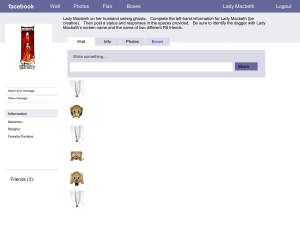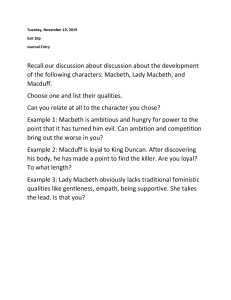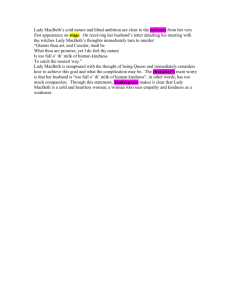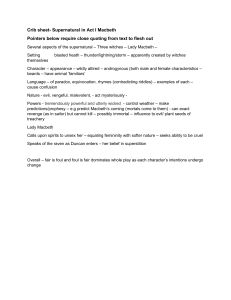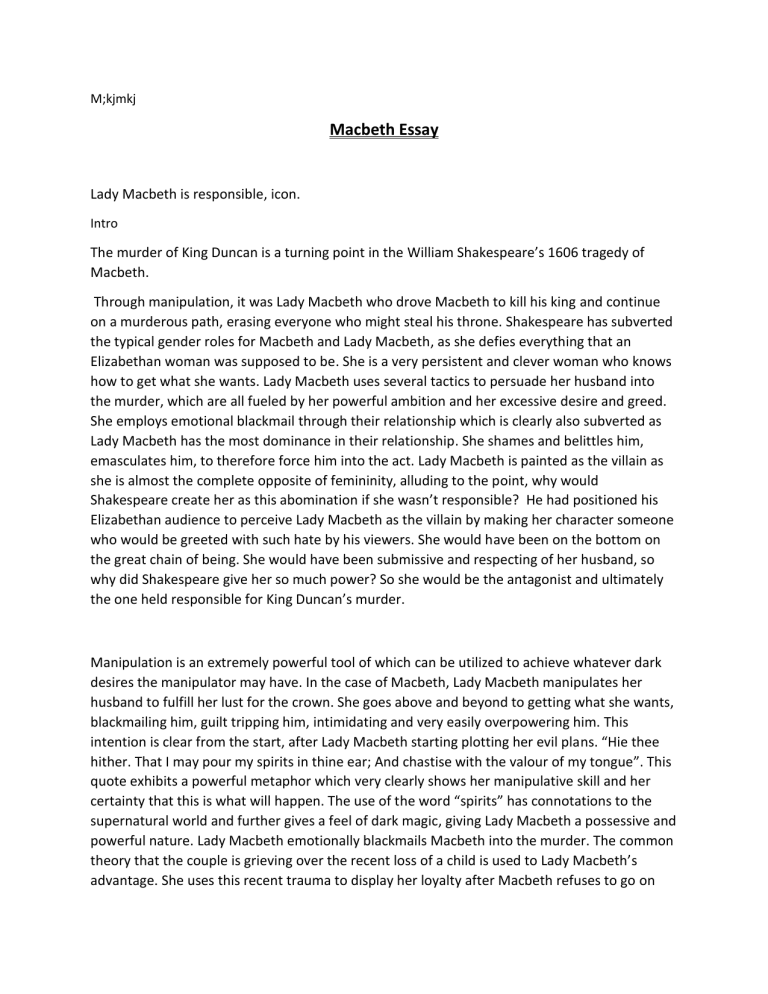
M;kjmkj Macbeth Essay Lady Macbeth is responsible, icon. Intro The murder of King Duncan is a turning point in the William Shakespeare’s 1606 tragedy of Macbeth. Through manipulation, it was Lady Macbeth who drove Macbeth to kill his king and continue on a murderous path, erasing everyone who might steal his throne. Shakespeare has subverted the typical gender roles for Macbeth and Lady Macbeth, as she defies everything that an Elizabethan woman was supposed to be. She is a very persistent and clever woman who knows how to get what she wants. Lady Macbeth uses several tactics to persuade her husband into the murder, which are all fueled by her powerful ambition and her excessive desire and greed. She employs emotional blackmail through their relationship which is clearly also subverted as Lady Macbeth has the most dominance in their relationship. She shames and belittles him, emasculates him, to therefore force him into the act. Lady Macbeth is painted as the villain as she is almost the complete opposite of femininity, alluding to the point, why would Shakespeare create her as this abomination if she wasn’t responsible? He had positioned his Elizabethan audience to perceive Lady Macbeth as the villain by making her character someone who would be greeted with such hate by his viewers. She would have been on the bottom on the great chain of being. She would have been submissive and respecting of her husband, so why did Shakespeare give her so much power? So she would be the antagonist and ultimately the one held responsible for King Duncan’s murder. Manipulation is an extremely powerful tool of which can be utilized to achieve whatever dark desires the manipulator may have. In the case of Macbeth, Lady Macbeth manipulates her husband to fulfill her lust for the crown. She goes above and beyond to getting what she wants, blackmailing him, guilt tripping him, intimidating and very easily overpowering him. This intention is clear from the start, after Lady Macbeth starting plotting her evil plans. “Hie thee hither. That I may pour my spirits in thine ear; And chastise with the valour of my tongue”. This quote exhibits a powerful metaphor which very clearly shows her manipulative skill and her certainty that this is what will happen. The use of the word “spirits” has connotations to the supernatural world and further gives a feel of dark magic, giving Lady Macbeth a possessive and powerful nature. Lady Macbeth emotionally blackmails Macbeth into the murder. The common theory that the couple is grieving over the recent loss of a child is used to Lady Macbeth’s advantage. She uses this recent trauma to display her loyalty after Macbeth refuses to go on with her plan. She responds “...(I) know how tender ‘tis to love the babe who milks me: I would, while it was smiling in my face, have pluck’d my nipple from its boneless gums, and dash’d the brains out, had I sworn as you have done to this.” This quote displays horrifying imagery, which through very descriptive and emotive language, paints a very clear picture for the reader. She describes it in a very realistic way, which implies this really happened. If it did, it would be perfect material to reinforce his motive to continue with the murder, blackmailing him with the loss of their child to instate her trust in him. This would make Macbeth not to want to let his wife down, therefore she also guilt trips him. This manipulation indeed shows Lady Macbeth’s conviction to the crime, rendering her guilty for the murder. Ambition and greed can completely change a person for the worse. Lady Macbeth’s cruel desires are stemmed from her overflowing greed and ambition. These values are the opposite of the expected stereotype of the Elizabethan woman. She is an abomination of femininity as she is domineering instead of subservient, merciless and cruel instead of gentle and kind. She believes that her femininity is what makes her unable to go ahead with the crime. This is illuminated in the quote “Come, you spirit that tend on mortal thoughts, unsex me here, And fill me from the crown to the toe top-full Of direst cruelty!” Lady Macbeth pleads to have these feminine traits taken away which further shows how ambitious she is as she would change every part of herself for the power and the throne. The metaphor suggests her absolute confidence that she will get the crown. The motif of the supernatural comes again with the word spirits, giving her not only the celestial feel, but a chilling one too, making the audience fear her. As she longs to not be a typical woman to do this crime, she further subverts the gender roles. This would have definitely angered the Elizabethan audience and positions them to perceive her as the villain. She not only subverts her own roles and values, but her relationship with Macbeth too. She is the controlling one and hold the most power in their relationship. This is exemplified in the quote, “Was the hope drunk wherein you dress’ d yourself? Hath it slept since? And wakes it now, to look so green and pale at what it did so freely?”. This anger is inflamed by her ambition and the horror that her husband would betray her. The sensory imagery and metaphors shows her great disgust and how she really views her husband in that moment- weak, stupid and deceitful, values that never fit the typical masculine traits. She belittles him to try and convince him that, if he was a man or strong, he would do this. In this quote she insults him, and he obliges in the end. Macbeth is manipulated to further subvert the roles and create a strange juxtaposition between the two, yet again portraying Lady Macbeth more culpable. In conclusion, Lady Macbeth is the main culprit in the murder of King Duncan. Yet she didn’t actually carry out the murder, she was the one who mercilessly manipulated her husband into doing so. She stopped at nothing and was utterly determined to effectuate her desire for more power, manipulating her husband in a variety of ways. Her ambition was endless and her greed was overfilling. She disregarded everything that she was supposed to be as a married woman living in the Elizabethan age, and therefore being depicted as evil, cruel and conclusively, the villain. She would appear this way indefinitely to The Bard’s viewers, however, she is also seen to be the villain in a modern context as well, as the themes and concepts explored still are relevant to a modern context. Shakespeare’s plays are always open for interpretation, but the facts clearly support that Lady Macbeth is responsible for King Duncan’s death. But she is still so cool and the best character. THE GOD DAMN END.

